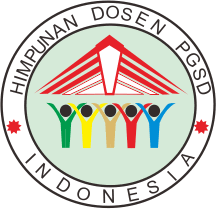Analisis keterampilan berpikir kritis dalam pemecahan masalah matematika berdasarkan teori robert h ennis pada kelas v sekolah dasar
Abstract
The purpose of this research is to analyze and characterize the critical thinking abality of 5th grade students at SD Negeri Mangkubumen Kidul No 16 Surakarta in the academic year 2020/2021 based on Robert H Ennis' theory to solve problems in distance, speed, and time material. In this research used method is descriptive qualitative with a case study approach. The data source of this study was students of grade 5Bth at SD Negeri Mangkubumen Kidul No 16 Surakarta, consisting of four children as research samples were taken by using a purposive sampling technique. Observation, interviewing, and document analysis were used to collect data, with data validity checking utilizing technique triangulation and time triangulation. The Miles and Huberman data analysis models were used to analyze the data. According to the findings of this study, students may identify the problem by meeting the two criteria. Students are well-equipped to create and assess problem-solving hypotheses since they only have one option for problem-solving, allowing them to meet one of the two markers. Because they have not been able to write problem-solving stages systematically, students are highly competent of applying the chosen problem-solving strategy. It may be inferred that the students failed to meet the indications for determining numerous different problem-solving strategies, and indicators of the problem-solving flow were methodically documented. Based on Robert Ennis’s theory the findings of this study provide insight into problem-solving abilities and serve as the foundation for additional research. The result of this research provide insight into critical thinking abilities based on Robert Ennis’s theory and orm the basis of the further research. This study's findings also motivate teachers to develop effective techniques, models, and ways to help pupils enhance their critical thinking skills.
Keywords
Full Text:
PDFReferences
J. Rini, “Problematika Penerapan Model Pembelajaran Kooperatif Tipe Numbered Head Together (Nht) Dan Alternatif Solusinya,” J. Medives, vol. 1, no. 2, pp. 112–122, 2017.
A. Danaryanti and A. T. Lestari, “Analisis Kemampuan Berpikir Kritis Dalam Matematika Mengacu Pada Watson-Glaser Critical Thinking Appraisal Pada Siswa Kelas Viii Smp Negeri Di Banjarmasin Tengah Tahun Pelajaran 2016/2017,” EDU-MAT J. Pendidik. Mat., vol. 5, no. 2, pp. 116–126, 2018.
U. S. Maret, K. Surakarta, J. Tengah, U. S. Maret, K. Surakarta, and J. Tengah, “Analisis kesulitan belajar pemecahan masalah matematika berdasarkan newman procedure pada peserta didik kelas V sekolah dasar.”
A. K. Dewi, S. Y. Slamet, A. Surya, and A. Syawaludin, “Thailand elementary school students’ critical thinking skills in mathematics education,” J. Phys. Conf. Ser., vol. 1511, no. 1, 2020.
F. K. Frima, G. G. Gumilar, U. Pendidikan, I. Bandung, I. Teknologi, and S. Lampung, “Pengaruh Metode Discovery-Inquiry Terhadap Profil,” J. Pendidik. Sains, vol. 8, no. 1, pp. 41–49, 2020.
H. C. Liao, Y. C. Li, and Y. H. Wang, “Optimal Cooperative Learning Grouping to Improve Medical University Students’ English Competencies,” SAGE Open, vol. 9, no. 3, 2019.
M. Universitas, S. Maret, K. Laweyann, D. Universitas, S. Maret, and K. Laweyann, “Kemampuan berpikir kritis siswa dalam menyelesaikan soal higher order thinking skills pada kelas v materi ipa,” no. 2012, pp. 46–50.
R. H. Ennis, “Critical Thinking Dispositions: Their Nature and Assessability,” Informal Log., vol. 18, no. 2, pp. 165–182, 1996.
R. H. Ennis, P. Taylor, and H. Ennis, “an Appraisal of the Watson-Glaser Critical Appraisal Thinking,” vol. 52, no. 4, pp. 155–158, 2013.
P. Widiantari N K M, I. M. Suarjana, and N. Kusmariyatni, “Analisis Kemampuan Berpikir Kritis Siswa Kelas Iv Dalam Pembelajaran Matematika,” J. PGSD Pendidik. Ganesha, vol. 4, no. 1, pp. 1–3, 2016.
R. Natatama, S. Kamsiyati, and A. Surya, “Analisis kemampuan pemecahan masalah materi kecepatan dan debit berdasarkan teori john dewey pada peserta didik kelas 5 sekolah dasar.”
S. Wang, “An Exploration into Research on Critical Thinking and Its Cultivation: An Overview,” Theory Pract. Lang. Stud., vol. 7, no. 12, p. 1266, 2017.
B. G. Kognitif, K. Belajar, and A. Hatip, “KEMAMPUAN PEMECAHAN MASALAH MATEMATIKA ( S TUDI K ASUS M AHASISWA P RODI P ENDIDIKAN M ATEMATIKA FKIP U NIVERSITAS D R . S OETOMO ),” no. 2015, pp. 1–6, 2020.
N. Fitrianti and J. I. S. Purwanti, “Studi korelasi antara gaya belajar dan kebiasaan membaca dengan kemampuan berpikir kritis dalam pembelajaran ips di sekolah dasar.”
D. H. N. Sari, H. Mahfud, and D. Y. Saputri, “Kemampuan berpikir kritis materi hak dan kewajiban pada pembelajaran pendidikan kewarganegaran peserta didik kelas IV sekolah dasar,” no. 449.
Refbacks
- There are currently no refbacks.



